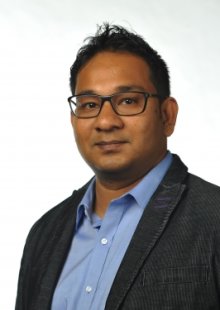
ABOUT
Dr. Khan’s group conceptualizes and fabricates solid state electronic devices that leverage interesting physics and novel phenomena in emerging materials (such as ferroelectrics, antiferroelectrics and strongly correlated/quantum materials) to overcome the “fundamental” limits in computation and to address the most pressing challenges in the semiconductor industry and the computing paradigms. His work led to the first experimental proof-of-concept demonstration of the negative capacitance–a novel physical phenomenon that can lead to ultra-low power computing and memory platforms by overcoming the fundamental "Boltzmann Limit" of 60 mV/decade subthreshold swing in field-effect transistors.
Asif Khan received his Ph.D. in electrical engineering and computer sciences from the University of California, Berkeley in 2015 and his B.S. degree in electrical and electronic engineering from Bangladesh University of Engineering and Technology (BUET) in 2007. He joined the School of Electrical and Computer Engineering at the Georgia Institute of Technology as a tenure-track assistant professor in the Spring of 2017.
PUBLICATIONS & PATENTS
A. I. Khan, “On the microscopic origin of negative capacitance in ferroelectric materials: A toy model (invited),” The International Electron Devices Meeting (IEDM), December 2018.
Z. Wang, B. Crafton, J. Gomez, R. Xu, A. Luo, Z. Krivokapic, L. Martin, S. Datta, A. Raychowdhury, A. I. Khan, “Experimental Demonstration of Ferroelectric Spiking Neurons for Unsupervised Clustering,” The International Electron Devices Meeting (IEDM), December 2018.
A. I. Khan, “Energy-efficient computing with negative capacitance,” in Advanced Nanoelectronics: Post-Silicon Materials and Devices, Muhammad Mustafa Hussain, Ed., Wiley-VCH (2018).
Z. Wang, A. A. Gaskell, M. Dopita, D. Kriegner, N. Tasneem, J. Mack, N. Mukherjee, Z. Karim, A. I. Khan, “Antiferroelectricity in lanthanum doped zirconia without metallic capping layers and post-deposition/-metallization anneals,” Appl. Phys. Lett. 112, 222902 (2018).
Z. Wang, S. Khandelwal, A. I. Khan. “Ferroelectric oscillators and their coupled networks," IEEE Electron Device Letters (2017).
A. I. Khan, K. Chatterjee, J. P. Duarte, Z. Lu, A. Sachid, S. Khandelwal, R. Ramesh, C. Hu & S. Salahuddin. “Negative capacitance in short channel FinFETs externally connected to an epitaxial ferroelectric capacitor," IEEE Electron Dev. Lett. 37, 111 (2016).
A. I. Khan, K. Chatterjee, B. Wang, S. Drapcho, L. You, C. Serrao, S. R Bakaul, R. Ramesh, & S. Salahuddin. “Negative capacitance in a ferroelectric capacitor," Nature Materials 14, 182 (2015).
A. I. Khan, D. Bhowmik, P. Yu, S. J. Kim, X. Pan, R. Ramesh, & S. Salahuddin. “Experimental evidence of ferroelectric negative capacitance in nanoscale heterostructures," Appl. Phys. Lett. 99, 113501 (2011).
A. I. Khan, C. W. Yeung, C. Hu, & S. Salahuddin. “Ferroelectric negative capacitance MOSFET: Capacitance tuning & antiferroelectric operation," Proc. Intl. Electron Devices Meeting (IEDM), pp. 11-3 (2011).
EDUCATION & AWARDS
- Qualcomm Innovation Fellowship (2012-13)
- Silver prize at the 5th TSMC Outstanding Student Research Award (2011)
- University Gold medal, Bangladesh University of Engg. & Tech. (2011)
- Kintarul Haque Gold Medal, Bangladesh University of Engg. & Tech. (2011)
- 1st prize in IEEE Region 10 Undergraduate Student Paper Contest (2006)
- 2nd prize in the IEEE History Society Undergraduate Student Paper Contest (2004)